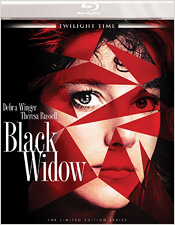Black Widow (Blu-ray Review)

Director
Bob RafelsonRelease Date(s)
1987 (October 13, 2015)Studio(s)
20th Century Fox (Twilight Time)- Film/Program Grade: A
- Video Grade: A
- Audio Grade: A
- Extras Grade: A
Review
The specialty Blu-ray label Twilight Time hits one out of the park yet again with the sublime limited edition release of Black Widow, a fascinating and gorgeous neo-noir from one of the more interesting directors of the “Easy Riders, Raging Bulls” era. By the time he made Black Widow in 1987, Bob Rafelson’s role in film history was secure: he had co-created the hit TV series The Monkees; he had co-produced Easy Rider, The Last Picture Show, and several other landmarks of the New Hollywood; and he had directed the 1971 classic Five Easy Pieces, among other terrific efforts. Yet for all of Rafelson’s activity in the late 1960s and early 1970s, his output became less frequent and more erratic by the time the ’80s and ’90s rolled around. Black Widow was his first film in six years, following the period noir remake The Postman Always Rings Twice with Jack Nicholson and Jessica Lange. That movie reworked the tropes of 1940s noir without significantly altering them, aside from taking advantage of a new era’s freedom in terms of explicit sexuality. By the time he got to Black Widow, however, Rafelson had something more, and something more interesting, in mind.
Like Postman, Black Widow owes something to early 20th-century crime fiction as well as post-WWII crime cinema, but it adapts the conventions to a contemporary setting. The movie follows a low-level but ambitious Justice Department employee (Debra Winger) who stumbles onto a female serial killer (Theresa Russell) whose specialty is marrying rich men, killing them for their money, and then assuming a new identity and doing it all over again. Winger becomes obsessed with Russell, simultaneously fascinated by her power and determined to bring her down, and the relationship that develops between the two women evolves into something truly unique in the annals of noir. Russell is a conventional femme fatale in many ways, but what’s not conventional is the fact that her adversary is another woman – and a strong woman at that, not the sad sack weak males of films like The Postman Always Rings Twice, Double Indemnity, or Out of the Past.
The result is a sort of feminist spin on the often misogynistic noir tradition, as well as a pointed commentary on 1980s consumerist values. Released in the same year that Michael Douglas proclaimed “Greed is good” in Wall Street, Black Widow is an ambivalent portrait of a rampant accumulation of property and consumer goods. Set in lush, upscale settings (the movie bounces from one expensive setting to another as Russell works her way through a collection of rich suckers), Black Widow sets up interesting dichotomies not only between the ways in which its two women deal with men but between the ways in which they live and work (or don’t). They’re defined by their surroundings in subtle, color-coded ways brilliantly brought to visual life by legendary cinematographer Conrad Hall (Butch Cassidy and the Sundance Kid), who, like Rafelson, was coming off of a bit of a hiatus. (He hadn’t made a movie since Marathon Man over ten years earlier.)
The film is a non-stop gallery of sumptuous, vibrant images, and the saturated palette looks terrific on Twilight Time’s new transfer, which also allows the viewer to fully appreciate the nuances of Hall’s interplay between light and shadow. As the two women play a sophisticated cat-and-mouse game both with each other and the men in the movie, Hall and Rafelson frequently underline their secrets via their expressive lighting and framing, which fragments the actresses’ faces into a series of reflections and shadows. The subtleties are impeccably captured in the transfer, which also boasts a crisp, clear stereo DTS-HD sound mix as well as an isolated track presenting Michael Small’s brilliant score. Film scholars Julie Kirgo and Nick Redman provide yet another of their indispensable audio commentaries, in which they brilliantly contextualize Black Widow within Rafelson’s career, 1980s cinema, and the film noir tradition. They also offer a bounty of enlightening trivia about the various actors and crew members, making the Black Widow special edition a wonderfully entertaining and informative cinema studies course as well as a top-notch presentation of a riveting thriller.
- Jim Hemphill

